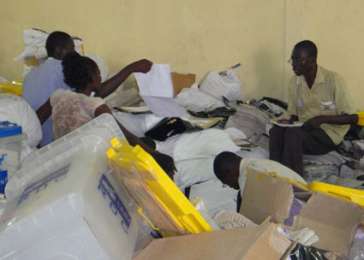December 08, 2011

By Dave Peterson
It was on Friday evening, on my way to the airport that word came over Okapi Radio that Jacques Djoli, the vice president of CENI, the Democratic Republic of the Congo’s election commission, would announce the preliminary results from three provinces. When he declared that incumbent President Joseph Kabila had won Equateur, Bas Congo and Bandundu by wide margins, we were stunned. All the credible reports we had received from civil society sources suggested the exact opposite: only Bandundu should have been too close to call and Etienne Tshisekedi should have been leading by a wide margin in Bas Congo. It was clear that Kabila and his allies were stealing the election with the complicity of the commission.
Tensions had been building in the capital, Kinshasa, and voters in some areas had already burned down polling stations where ballots pre-marked for Kabila had been discovered. We knew that the pattern of fraud would likely continue, and the country was bound to explode. The final date for preliminary results was December 6, but now all bets were off. My civil society friends would be shutting up their offices and heading for cover soon. Assuming that in the ensuing chaos the government would be moving quickly to settle scores against its political opponents, as well as those in the human rights movement who had dared to criticize it, they had reason to worry.
It didn’t have to be this way.
The universal assessment was that the elections had been a reasonably successful process, despite logistical problems and unfortunate but isolated incidents of violence. Voters had been vigilant and passionate. Poll workers had done their best, and the police had been well behaved.
However, on the first day, certain instructions did not seem to have reached all the polling officials, and voter illiteracy and lack of civic education compounded the problem. Ominously, ballots and results sheets were not secured as carefully as they should have been. Some stations, especially those in opposition areas, didn’t receive enough ballots. The violence seemed consistently to be a product of voters detecting fraud. Although the process went well in Kinshasa and most of the country, there were a number of exceptions. It was reported to the UN that in Kasai Occidental, an opposition stronghold, 145 stations had been burned down, and for this reason the CENI would annul the vote there.
Nevertheless, civil society groups contended that they had been successful in persuading voters not to be seduced by gifts from politicians, but to turn out in massive numbers and vote peacefully for those best able to lead the country and not those who had committed human rights violations. They criticized politicians on all sides who had incited violence during the campaign, and urged Congolese to continue to remain calm. Tshisekedi’s followers in the streets were declaring their willingness to die for him, however, and the attitude among activists also seems to have become more fatalistic.
The international community has not emerged from the election with much credit. International funding for the process was a fraction of what it had been in 2006, and I was dismayed at how many Congolese seemed convinced that the international community favored Kabila because he would protect their interests, and had pre-determined the outcome. I was told that, although Tshisekedi might be unpredictable, and would have to be monitored closely were he to become president, he understood the West and would encourage responsible foreign investment. Some of Tshisekedi’s advisors, such as Valentin Mubake, might be problematic. But simply an alternation of power is needed, even if Tshisekedi is not the ideal president.
Kabila, on the other hand, could be depended on to continue the same system of bad governance, impunity, and massive suffering. His policies have exhausted the country. Should Kabila try to steal the election as expected, the international community would have to intervene to stop him, activists suggested, but that’s a faint hope. There has been some progress in Congo. The police have committed fewer human rights abuses, thanks to international training by the Japanese. The military has suffered as much as anyone during the past ten years, and with the exception of its top leadership, should remain neutral. Congolese are clearly showing a greater understanding of and commitment to democracy.
Congo has the resources to emerge from the current disorder. And Congolese civil society will not give up the struggle, as beleaguered as it may be. More emphasis needs to be placed on Congolese youth. The extremely high rates of unemployment, cost of education, and manipulation by politicians, such as Kabila’s sports teams, pose serious challenges. Grassroots education at the communal level and in the schools also seems important given the evident evolution in Congolese attitudes and the need to overcome the culture of corruption. Improving the accountability of local government will become increasingly meaningful assuming Congo is able to hold the provincial elections next year and local elections in 2013.
At this moment, Congo’s future hangs in the balance. Although a firm international stand against rigging by the incumbent, such as occurred a year ago in the case of Cote d’Ivoire, does not seem likely.
Preventing a descent into chaos may be the best we can hope for. Now is the time for some hard, courageous, decisions.
Dave Peterson is senior director of the National Endowment for Democracy’s Africa program. He recently returned from monitoring the election. The views expressed here are his own.
